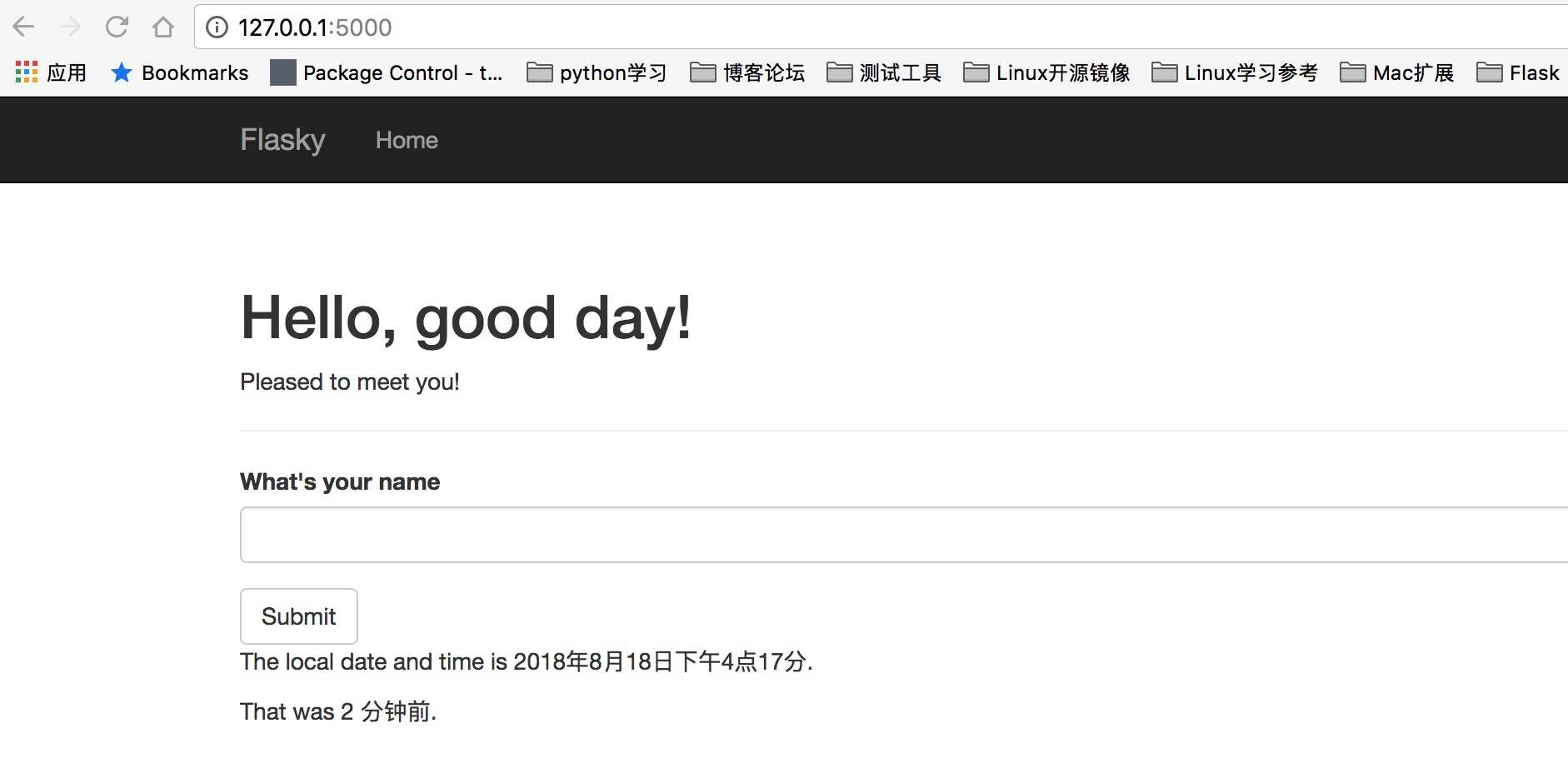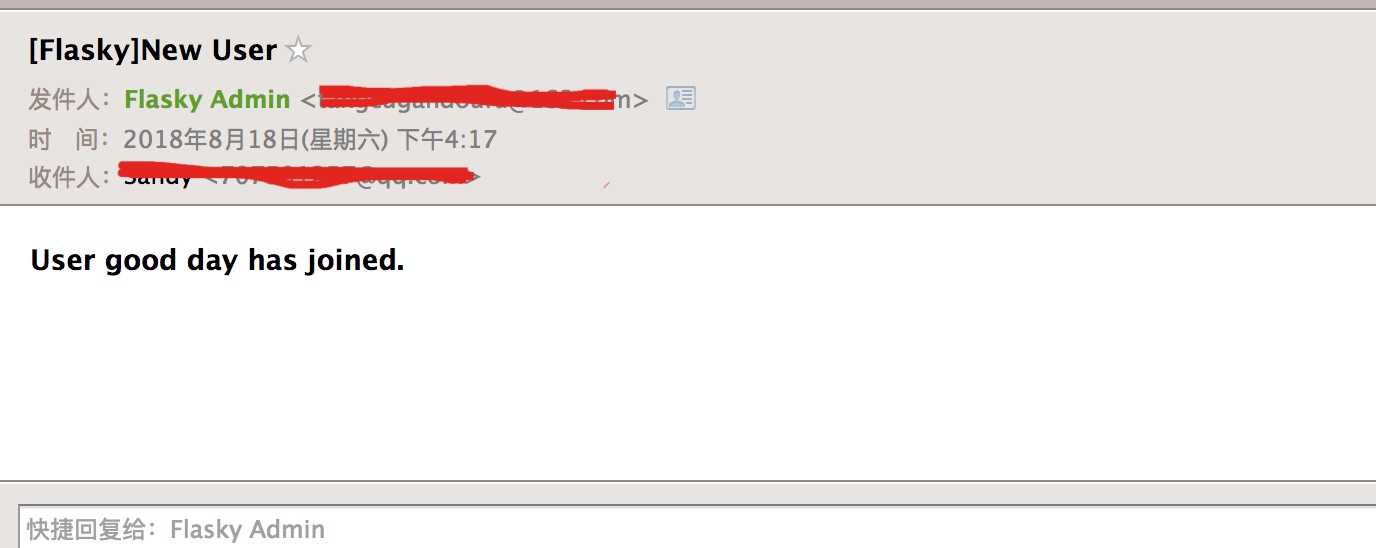标签:message 增加 xxxxx auth starting get debugger .config environ
在我们开发完web系统后,一些特定的事件发生时,系统要自动发送相关邮件至管理员,运维人员和其他相关人员。python标准库中的smtplib包也可以用在Flask程序中发送邮,但包装了smtplib的flask-mail扩展能更好地和Flask集成。本篇文章简单介绍一下如何使用flask-mail扩展发送邮件。
网易邮箱服务器信息:(测试时使用的是网易邮箱地址作为发件者,配置时使用下方信息)
| 服务器名称 | 服务器地址 | SSL协议端口号 | 非SSL协议端口号 |
|---|---|---|---|
| IMAP | imap.163.com | 993 | 143 |
| SMTP | smtp.163.com | 465/994 | 25 |
| POP3 | Pop.163.com | 995 | 110 |
查看安装情况: pip show flask-mail, 信息如下,说明安装成功
Name: Flask-Mail Version: 0.9.1 Summary: Flask extension for sending email Home-page: https://github.com/rduplain/flask-mail Author: Dan Jacob Author-email: danjac354@gmail.com License: BSD Location: /anaconda3/envs/flaskdev/lib/python3.6/site-packages Requires: Flask, blinker Required-by:
发送邮件用的邮箱账号、密码没有直接写在脚本中,将账号密码添加到本地的环境变量,然后通过os模块去调取。这么做也是为了安全起见。
设置方法:
mac os/linux
export MAIL_USERNAME=‘你的邮箱账号‘
export MAIL_PASSWORD=‘客户端授权密码‘
如果想永久有效,把上面两句话加到配置文件中,mac(~/.bash_profile),linux(~/.bashrc)
windows
set MAIL_USERNAME=‘你的邮箱账号‘
set MAIL_PASSWORD=‘客户端授权密码‘
如果想永久有效,右击 我的电脑 -> 属性 -> 高级系统设置 -> 环境变量,添加MAIL_USERNAME,MAIL_PASSWORD;有疑问的话可以百度一下,很简单。
注意事项:MAIL_PASSWORD,是客户端授权密码,和你常规登录邮箱使用的密码是两回事儿,如果不知道自己的客户端授权密码,可以百度搜索一下,具体的步骤就不在这里写了。
初步测试:
import os from flask import Flask from flask_script import Manager from flask_mail import Mail, Message ? app = Flask(__name__) app.config[‘MAIL_SERVER‘] = ‘smtp.163.com‘ app.config[‘MAIL_PORT‘] = 25 app.config[‘MAIL_USE_TLS‘] = True app.config[‘MAIL_USERNAME‘] = os.environ.get(‘MAIL_USERNAME‘) app.config[‘MAIL_PASSWORD‘] = os.environ.get(‘MAIL_PASSWORD‘) ? manager = Manager(app) mail = Mail(app) ? ? if __name__ == ‘__main__‘: manager.run()
终端操作:
(flaskdev) user@snow:~/codes/python$python debug.py shell >>> from flask_mail import Message >>> from debug import mail >>> msg = Message(‘Flask Test Mail‘, sender=‘发件人‘, recipients=[‘收件人1‘,‘收件人2‘]) >>> msg.body = ‘邮件内容‘ >>> msg.html = ‘<b>来自大师兄的问候</b>‘ >>> with app.app_context(): ... mail.send(msg) ... # Message参数说明: # 第一个参数:邮件主题 # 第二个参数:发件人邮箱账号 # 第三个参数:收件人邮箱账号(可以写一个或多个) # msg.body和msg.html是邮件正文
测试可以发送成功:

脚本修改:
app.config[‘FLASKY_MAIL_SUBJECT_PREFIX‘] = ‘[Flasky]‘ app.config[‘FLASKY_MAIL_SENDER‘] = ‘Flasky Admin <xxxxx@163.com>‘ app.config[‘FLASKY_ADMIN‘] = os.environ.get(‘FLASKY_ADMIN‘) # 增加发送邮件函数 def send_mail(to, subject, template, **kwargs): msg = Message(app.config[‘FLASKY_MAIL_SUBJECT_PREFIX‘] + subject, sender=app.config[‘FLASKY_MAIL_SENDER‘], recipients=[to]) msg.body = render_template(template + ‘.txt‘, **kwargs) msg.html = render_template(template + ‘.html‘, **kwargs) mail.send(msg) # 修改视图函数,条件满足(本例是有新用户登录系统时),自动触发发送邮件 @app.route(‘/‘, methods=[‘GET‘, ‘POST‘]) def index(): form = NameForm() if form.validate_on_submit(): user = User.query.filter_by(username=form.name.data).first() if user is None: user = User(username=form.name.data) db.session.add(user) session[‘known‘] = False if app.config[‘FLASKY_ADMIN‘]: send_mail(app.config[‘FLASKY_ADMIN‘], ‘New User‘, ‘mail/new_user‘, user=user) else: session[‘known‘] = True session[‘name‘] = form.name.data form.name.data = ‘‘ return redirect(url_for(‘index‘)) return render_template(‘index.html‘, form=form, name=session.get(‘name‘), current_time = datetime.utcnow(), known=session.get(‘known‘, False))
终端运行程序,新用户登录:
(flaskdev) user@snow:~/GitHubCodes/learnFlask$python hello.py runserver -d * Serving Flask app "hello" (lazy loading) * Environment: production WARNING: Do not use the development server in a production environment. Use a production WSGI server instead. * Debug mode: on * Running on http://127.0.0.1:5000/ (Press CTRL+C to quit) * Restarting with stat * Debugger is active! * Debugger PIN: 103-932-194 127.0.0.1 - - [18/Aug/2018 16:16:53] "GET / HTTP/1.1" 200 - 127.0.0.1 - - [18/Aug/2018 16:17:20] "POST / HTTP/1.1" 302 - 127.0.0.1 - - [18/Aug/2018 16:17:20] "GET / HTTP/1.1" 200 - 127.0.0.1 - - [18/Aug/2018 16:17:48] "POST / HTTP/1.1" 302 - 127.0.0.1 - - [18/Aug/2018 16:17:48] "GET / HTTP/1.1" 200 -
浏览器:

收邮箱:

以上就是关于使用flask-mail扩展发送邮件的实际操作
源码地址:https://github.com/miguelgrinberg/flasky.git;git checkout 6a
标签:message 增加 xxxxx auth starting get debugger .config environ
原文地址:https://www.cnblogs.com/gandoufu/p/9497703.html